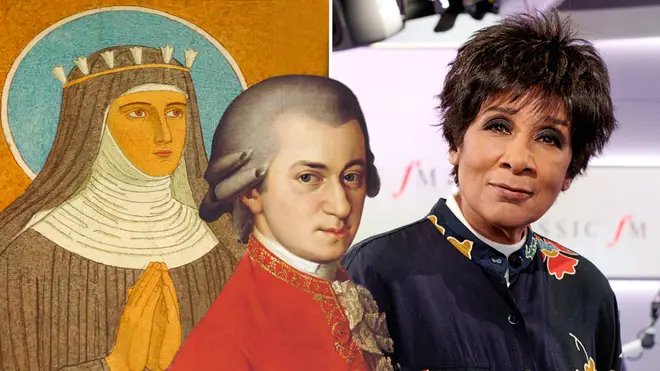On Air Now
Relaxing Evenings with Zeb Soanes 7pm - 10pm
31 March 2021, 08:48 | Updated: 12 April 2021, 16:44

Legendary broadcaster Moira Stuart presented a special new series across the Easter weekend on Classic FM, telling the historical tale of classical music.
Join Moira Stuart for The Classic FM Chronicles, a new four-part series taking us through the abridged history of classical music.
Perfect for newcomers and ardent fans of classical music alike, explore the world’s greatest composers, their wonderful music, and fascinating insights into the times that influenced them with Moira.
The first hour-long show aired on Good Friday from 9pm to 10pm, and continued every evening until Monday 5 April, over Easter.

‘Creepy’ new AI brings great classical composers to life with deepfakery
Here’s all you need to know about the episodes:
Moira Stuart begins the special series with a selection of composers and music from across eight centuries and four periods of classical music – all in the space of an hour.
The music of Hildegard of Bingen will take us back as far as the 11th century to the early period of classical music, before we fast forward to the 16th century and to the Renaissance period: an era of discovery, innovation and exploration for classical music, with music by British composer Thomas Tallis.
The likes of Bach, Vivaldi, Purcell and Handel will also feature, composers who pioneered new musical styles during the Baroque period of the 17th century.
Finally, we visit the early Classical period of the 18th century, which again saw great progression in the world of music, including works from one of the most gifted musicians in history, Mozart, as well as Haydn and Chevalier de Meude-Monpas.
Moira continues her musical journey through the ages, and spends Saturday evening exploring the Classical and Early romantic periods.
The Romantic era of the 19th century became known for its intense energy and passion, with the more rigid forms of classical music giving way to greater expression, as music grew closer to art, literature and theatre.
Music by the Italian composer Rossini and his work The Barber of Seville features, along with pieces from Schubert and French composer Louise Farrenc.
It was also in the Romantic era when the virtuoso was born. Liszt and Chopin were two of the greatest of their time, who both wrote demanding piano music to show off their own brilliance.
The evening concludes with German pianist, composer and piano teacher Clara Schumann, who is regarded as one of the most distinguished pianists of the era.

Warren Mailey-Smith plays Chopin's 'Minute' Waltz
In the third episode of the series, Moira shines the spotlight on the Late Romantic period of classical music.
As with the Early Romantic period, composers continued to embrace their passionate side and attempted to use music to express deep emotions from tragedy to love – so Moira features Dvořák’s ‘New World’ symphony, Verdi’s opera Nabucco, and Elgar’s ‘Enigma’ variations.
We also learn how the expansion of the orchestra helped Tchaikovsky bring The Nutcracker to life, and why Mahler decided that less than 1,000 performers was simply not enough.
Meanwhile, in France, musical impressionists – like their painting counterparts – transcribed their emotions onto paper, as heard in Debussy’s Suite Bergamasque.
Composers such as Coleridge-Taylor also used their incredible compositions to fight against racial prejudice, paving the way for the likes of Florence Price, who was the first African-American woman to have her music performed by a major symphony orchestra.
On Monday evening, Moira travels to the Neo-classical period before concluding the series in the 21st century.
The history and politics of the 20th century provided inspiration for the diverse range of musical styles developed between 1900 and 1999, pioneered by composers ranging from Shostakovich to Britten.
Composers reacted against established musical trends, creating exciting new forms and styles, including American composers like Scott Joplin, who began to fuse classical music with jazz and ragtime, and George Walker, who became the first African-American to win the Pulitzer Prize for Music. Moira plays their works The Entertainer and Lyric for Strings.
Meanwhile, film music and video game music increased in popularity towards the end of the century, with scores by the likes of John Williams for the big screen and Nobuo Uematsu for the games console making their mark on classical music.
Classic FM is available across the UK on 100-102 FM, DAB digital radio and TV, on Global Player, the official Classic FM app, on your smart speaker (“play Classic FM”), iOS or Android device and at ClassicFM.com.